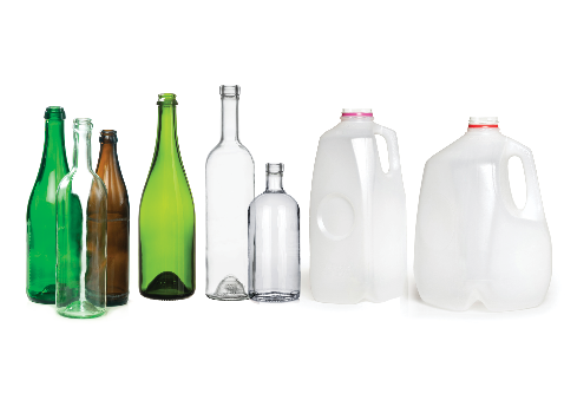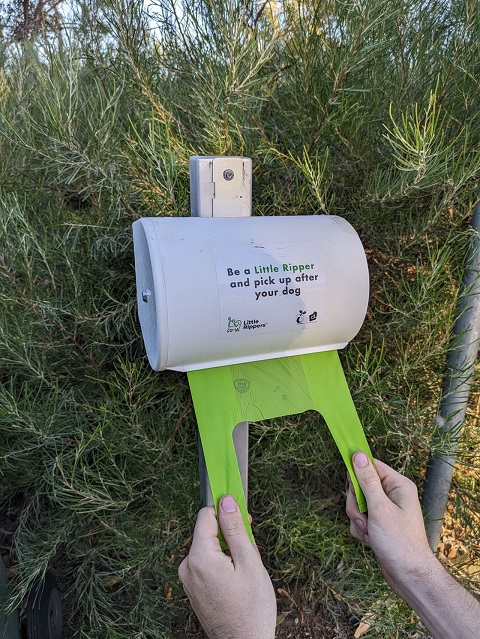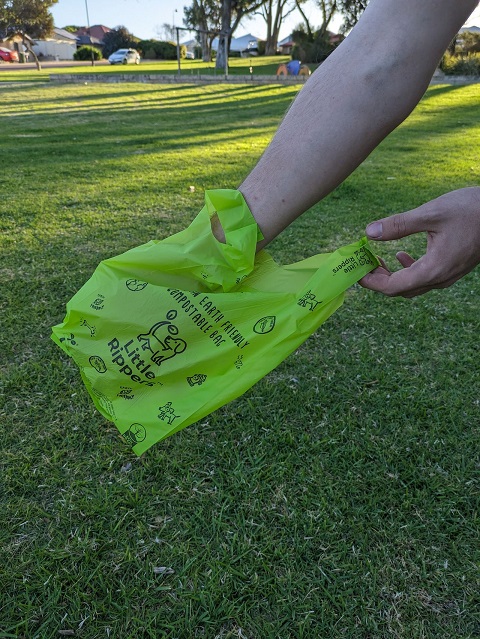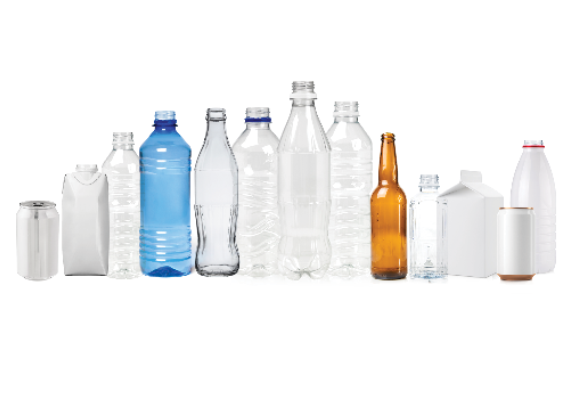Cleanaway, in partnership with the City, operate the Waste Management Centre, located in Parklands. The facility is equipped to accept numerous items for proper disposal and handles both household and commercial waste.
The centre offers free disposal for a range of different items including: household hazardous waste (such as batteries, paint, e-waste, gas bottles, and engine oil), scrap metal (like fridges and washing machines), and cardboard.
Accepted waste items
- General waste/rubbish and junk
- Construction waste
- Green waste (tree/bush/lawn clippings)
- Asbestos (bulk quantities not accepted) - visit the health and safety page for more information
Accepted recyclable items
- Bulk cardboard*
- Car parts
- Lead-acid (car batteries)*
- Household lightbulbs (CFL’s and Flurotubes)*
- E-Waste*
- Gas cylinders, flares and EPIRBS
- Motor oil*
- Mattresses and tyres
- White goods
- Scrap metal*
- Paint*
- Car parts
- Household batteries*
- Mobile phones*
- Household hazardous chemicals*
*Free disposal, limits may apply
Operating Hours
The facility is open 7 days a week (except Christmas Day and Good Friday).
Monday - Friday 7am to 4pm.
Weekends and Public Holidays 8am to 5pm.
Payment and Fees
Fees apply for disposing of some types of waste at the centre when waste vouchers are not presented.
Credit card and EFTPOS payments are accepted.
Important notes:
- Each load of waste entering the facility will be assessed by the weighbridge attendant whose decision shall be final
- A demonstration trailer is located at the front of the weighbridge to assist in estimating waste volumes
- Children and pets must remain in the vehicle at all times whilst within the facility
- No scavenging of waste is permitted on the site
- The City’s Waste Management Local Laws 2010 govern the operation of the facility
The City provides ratepayers with four waste vouchers per year. You will find these vouchers attached to your annual rates notice. If you are renting, please contact your property manager/owner for your waste vouchers.
The vouchers provide free disposal of:
- 2 cubic metres of clean, uncontaminated green waste
- 2 cubic metres of general household waste
The green waste voucher entitles the ratepayer to free disposal of 1m3 (6’ x 4’ trailer) of uncontaminated green waste from their premises at the City’s Waste Management Centre. Vouchers can be used for cars, trailers and utilities.
The general waste voucher entitles the ratepayer to free disposal of 1m3 (6’ x 4’ trailer) of general, inert or green waste from their premises at the City’s Waste Management Centre. Vouchers can be used for cars, trailers and utilities.
Important notes:
- General waste vouchers cannot be used for tyres or asbestos
- General waste vouchers will be accepted for the disposal of green waste but not vice versa
- Each voucher is individually barcoded to the property address and may only be used once
- The vouchers are valid for one year only and expire on 31 August each year. The expiry date is clearly marked on each voucher in red writing and out of date vouchers will not be accepted – no exceptions
- Vouchers cannot be used for the disposal of waste from large trucks
- Vouchers are only issued to ratepayers. Tenants need to liaise with the homeowner or property manager in order to access vouchers for their rental property
- Vouchers are not transferable and cannot be sold through social media outlets. Vouchers can be tracked through the barcode and the City will void any vouchers that are sold/purchased
- The colour of the vouchers change each year for easy recognition
If you have lost your waste vouchers, please contact the City. If they are unused, additional vouchers may be issued after providing a statutory declaration.
Where do I find my waste vouchers?
The waste vouchers are attached to the bottom of the annual Rates Notice issued to ratepayers in July each year. The vouchers are only valid for a 12 month period and expire on 31 August each year.
I have lost or misplaced my waste voucher, do I still have to pay when I dispose of waste at the Waste Management Centre?
A ratepayer can attend Council’s Administration building at 3 Peel Street, Mandurah and complete a statutory declaration to request a new set of vouchers if they have been misplaced or stolen. As vouchers contain a unique bar code specific to each property the City can check the Waste Management Centre database to ascertain if any of the vouchers have already been used. Only those vouchers that have been unused will be issued once the Statutory Declaration has been completed.
When is the Waste Management Centre open?
The Waste Management Centre is open every day of the year except Christmas Day and Good Friday. The operating hours are:
Monday – Friday (7am – 4pm)
Weekend and Public Holidays (8am – 5pm)
Please note that the front gate is shut promptly in accordance with the above times and late entry will not be permitted.
For holiday and alternate hours, please download the pdf.
I live in a rental property and the owner has sent me their waste vouchers. Can I use them?
Yes, if you live in a rental property within the City of Mandurah, the property owner or managing agent may give you their waste vouchers to use.
I receive my rates notice via email. Can I show my waste vouchers on my smartphone or tablet?
The barcode scanners at the WMC gatehouse can usually scan the barcode on a smartphone or tablet. If the scanner cannot read the voucher the gate attendant can enter the barcode manually into the weighbridge software.
Can I use last year’s waste vouchers if I haven’t already used them?
No, waste vouchers are only valid for one year and expire on the 31 August each year. The expiry date is clearly marked on the waste voucher in red and the weighbridge software at the gatehouse will reject any out of date voucher. The gate attendants at the Waste Management Centre have no discretion to accept out of date vouchers.
I’m a Department of Housing tenant. Do I have access to waste vouchers?
Yes, the tenant should contact the Department of Housing office in Mandurah to enquire about accessing the vouchers for their property.
If I forgot my vouchers when attending the Waste Management Centre, can I just show my ID?
No, a resident must have a valid voucher in their possession when attending the Waste Management Centre if they wish to obtain free access. The Waste Management Centre is managed by Cleanaway under contract and they do not have access to the City’s property database system so as to confirm if you are a resident or ratepayer. If you don’t have a valid voucher in your possession when attending the WMC you will either have to return home to collect the voucher or pay the applicable gate fee.
If I have no intention of using my vouchers, can I sell them on Facebook or social media outlets?
No, the vouchers are allocated to the individual property and contain a bar code that is unique to the property, which can allow for the vouchers to be tracked. If the City is made aware that vouchers are being sold through social media outlets, then vouchers will be voided and will therefore be rejected when attending the facility.
Members of the public are able to weigh their trailer, boat, caravan or camper at the Waste Management Centre.
As of 1 April 2021, public weigh bridge transactions will only occur on the following days and times:
- Monday - Friday (7.00am - 11.00am excluding public holidays)
- Saturday (by appointment only call 9587 4660)
- Sunday (closed)
What is HHW?
Household hazardous waste includes products that are flammable, toxic, explosive, or corrosive. These materials can cause serious environmental damage if disposed of improperly, including contamination of waterways, soil, and vegetation.
HHW is dangerous at all stages, as it can:
- Cause poisoning or burns if ingested, inhaled, or in contact with skin
- React with heat or chemicals to cause fires or toxic fumes
- Leak into the ground, contaminating soil and groundwater
- Injure waste collectors if placed in household bins or for verge collections
- Pollute the environment if sent to landfill
HHW Program
The Government of Western Australia funds the collection and proper disposal of hazardous materials at the Waste Management Centre. This service is free, even for non-residents of Mandurah.
Accepted materials include:
- Batteries, aerosols, acids, alkalis
- Engine coolants, fire extinguishers, flares
- Fluorescent lamps, gas cylinders, chemicals
- Paint, pesticides, herbicides, poisons
- Pool chemicals, smoke detectors
- The program accepts domestic quantities only (up to 20kg or 20L).
Reducing HHW
You can help reduce hazardous waste by following these steps:
- Read labels carefully
- Opt for safer, non-toxic alternatives
- Buy only what you need
- Use green cleaning and gardening products
For more information, check the HHW Program Brochure or drop off your hazardous items at the Waste Management Centre for disposal.
Books, clothing, furniture, shoes and bric-a-brac
Unwanted items can often find a new home through swapping, selling or donating.
- Good Sammy Home Collection for large, heavy and fragile items 9463 0500
- Salvation Army Home Collection Service (no wire-frame beds or whitegoods) 13 72 58
- St Vincent de Paul Society (no electrical goods) 6323 7520
Printer cartridges
For recycling of printer cartridges, visit:
- The Good Guys - Mandurah Home City, Mandurah
- JB HiFi - Mandurah Home City, Mandurah
- Harvey Norman - 9 Gordon Road, Mandurah
- Officeworks - 8 Magenta Terrace, Mandurah
- Australia Post - Miami Shopping Centre, Falcon
Or contact Cartridges 4 Planet Ark 1800 242 473 or the Mandurah Waste Alliance 9587 4660
Mobile phones and devices
All makes, models, and accessories can be recycled through the mobile muster program. Find a drop off point:
- Telstra Mandurah - Mandurah Forum Shopping Centre, Mandurah
- Vodafone Mandurah - Mandurah Forum Shopping Centre, Mandurah
- Yes Optus Mandurah - Mandurah Forum, Mandurah
- City of Mandurah Recycling Hubs
- Mandurah Waste Management Centre - 80 Corsican Place, Parklands
- Battery World Mandurah - 3 Kulin Way, Mandurah
- Salvos Mandurah - 3 Shepherd Road, Mandurah
- Officeworks Mandurah - 8 Magenta Terrace Mandurah
- Telstra Halls Head - Halls Head Central, Halls Head
- Salvos Halls Head – Halls Head Central, Halls Head
- Teleguru - Miami Shopping Centre, Falcon
Or contact MobileMuster at 1800 249 113
Car batteries / motor oil
FREE disposal of car batteries and motor oil:
- Waste Management Centre 9587 4660
Old medicines
If you have leftover or expired medicines at home, please discuss with your pharmacist the correct way to dispose of them. Many pharmacies will collect old medicines an dispose of them properly through the wholesalers.
E-Waste
E-Waste, or electronic and electrical items, are no longer accepted in verge collections or in kerbside bins due to State Government regulations. These items include printers, keyboards, TV’s, mobile phones, and wires.
Our desire to have the newest, fastest, most up-to-date electronics has led to e-waste becoming the world’s fastest growing volume of waste. the ‘old’ items we throw out may contain several hazardous substances such as arsenic and cadmium that can adversely impact on our health and the environment. Up to 75% of the toxic chemicals found in landfills (tips) can be linked to electronic waste.
This equipment also contains significant quantities of valuable materials that can be recovered or recycled for reuse. Glass, plastics, aluminium, gold, silver and other metals found in casings and screws can be recycled or re-manufactured into a multitude of products. When disposed of correctly, the majority of these valuable materials and toxic substances can be recovered and reprocessed for reuse, and the remaining 1% will be disposed of safely and responsibly.
How can I reduce, reuse or recycle my e-waste?
Consider the possibility of upgrading or repairing your existing equipment and if you really do need to replace your equipment, ask if family, friends, or local charities can use it if still in working order. When it truly is at the end of its life, take it to your local e-waste recycling facility.
Where can I take my e-waste?
The Waste Management Centre will take your ‘old’, irreparable electronic equipment and arrange for valuable materials to be recovered and the safe disposal of harmful substances. Mobile phones and devices can be dropped off at the City's Recycling Hubs.
Batteries
Around 90% of all batteries are incorrectly disposed of, with 18 million batteries going to landfill in Western Australia every year. Dry-cell (household) batteries make up about 60% of those batteries.
Batteries contain non-renewable minerals and metals. By separating batteries from your ordinary household rubbish so they don't go to landfill enables their reuse in a range of products.
Some batteries still contain heavy metals which could be harmful to health and wildlife if they break down and leak into the environment. Batteries disposed in kerbside bins can cause fires in collection trucks and waste management centres. Recycling batteries in the proper way can reduce these risks.
How can I recycle my household batteries?
- Store your batteries in a cool, dry, well-ventilated area
- Drop your batteries off at a battery recycle bin - refer to local collection points below
- Place your batteries into the battery recycle bin
- Batteries will be collected when the bins are filled and transported for recycling.
Local Collection Points
- City of Mandurah Administration Building - 3 Peel Street, Mandurah
- Mandurah Aquatic and Recreation Centre – 303 Pinjarra Road, Mandurah
- Billy Dower Youth Centre – 41 Dower Street, Mandurah
- Lakelands Library - 49 Banksiadale Gate, Lakelands
- Mandurah Library - 331 Pinjarra Road, Mandurah
- Falcon eLibrary & Community Centre - Flavia Street, Falcon
- Mandurah Performing Arts Centre - Ormsby Terrace, Mandurah
- Mandurah Officeworks - 8 Magenta Terrace, Mandurah
- Waste Management Centre - 80 Corsican Place, Parklands
- Woolworths, Coles & Aldi Supermarkets
Soft Plastics
Soft plastics are soft ‘scrunchable’ plastics like cling wrap, bubble wrap, lolly wrappers, chip packets, cereal bags, plastic bags. Unfortunately, there is no current recycling program for soft plastics and they do not belong in kerbside recycling bins.
If you are able to, purchasing less soft plastic can go a long way for our environment. Choosing items with minimal packaging, using reusable bags and contacting producers to request that they minimise unnecessary packaging are ways to help reduce our plastic pollution.
Recycling Compact Fluorescent Lamps (CFLs)
As they contain very small amounts of mercury vapour (3-5mgs), CFLs must be collected separately to prevent them from breaking and to ensure they are recycled correctly.
Advances in recycling technology allow mercury-bearing CFLs and fluorescent tubes to be safely and completely recycled.
To prevent hazardous mercury ending up in our environment it is important these globes and tubes do not go into your household recycling or rubbish bins.
Please take your unbroken CFLs and tubes to the Waste Management Centre, or one of the City's recycling hubs. From here they will be safely transported off-site to be fully recycled.
What do I do if a CFL breaks?
- If indoors, ventilate the area
- Remain at a safe distance for 15 minutes
- Do not vacuum! Using gloves, place the broken glass into a sealed container for disposal in the general rubbish bin
- Use damp paper, or sticky tape on carpet, to pick up the finer particles and place in a sealed container for disposal
Why upgrade to CFLs?
CFLs save around 80% of energy used for lighting when compared to an incandescent bulb.
They are also 100% recyclable making them a much more environmentally friendly alternative. With lighting accounting for around 12% of all electricity in the home, the Government decided to phase out incandescent bulbs by restricting sales in favour of CFLs in order to save energy and reduce pollution. Incandescent bulbs can no longer be purchased.
All the materials used to manufacture CFLs can be recycled into new products including glass wool insulation for buildings, dental amalgam (fillings), fertilisers and aluminium foundry products.
CFLs are completely recyclable however they CANNOT be placed in your yellow lid recycling bin.
Residents can place one 5L container of used engine oil (in its original container) and one car battery at least 0.5m away from the recycling bin, ensuring they are clearly visible to the driver. These items will be collected by the City’s waste contractor and transported to the Waste Management Centre for recycling.
Alternatively, take items directly to the Waste Management Centre for free disposal.
There is no landfill in Mandurah that can receive the City’s municipal waste, the Waste Management Centre located in Parklands is a transfer station (waste will be sent elsewhere). There is no likelihood of a landfill in Mandurah due to the lack of viable land and environmental reasons.
All the City’s municipal waste will be transferred to Kwinana’s Energy Recovery Facility in the first instance.
Containers For Change is a recycling program that aims at reducing litter and promoting recycling. The initiative incentivizes individuals, groups, and businesses to collect and return eligible beverage containers, such as bottles and cans, in exchange for a 10-cent refund for each container. Once collected, the containers are sorted, processed, and recycled, contributing to environmental sustainability by reducing waste and conserving resources.
There are several refund points in Mandurah.
Bag drop locations:
- Mandurah Recycling - 13 Gordon Road, Mandurah (Monday to Saturday)
- Good Sammy Recycling - 120 Pinjarra Road, Mandurah (Monday to Sunday)
- Community Recycling WA Mandurah Central - Lane Group Stadium, Clarice Street, Mandurah (24/7)
- Community Recycling WA Dawesville - Ocean Road Sporting Pavilion, Moora Close, Dawesville (24/7)
- Community Recycling WA Erskine - 39 Galbraith Loop, Erskine (Monday to Saturday 8am-4pm)
Depot locations:
- Mandurah Recycling - 13 Gordon Road, Mandurah (Monday to Saturday)
- Containers for Cash Mandurah - 5 Rafferty Road, Mandurah (Monday to Sunday)
- Community Recycling WA Erskine - 39 Galbraith Loop, Erskine (Monday to Saturday 8am-4pm)
- Community Recycling WA Mandurah Central - Lane Group Stadium, Clarice Street, Mandurah (Monday to Wednesday 9am-1pm, Thursday 1pm-5pm)
Pop up
- Community Recycling Mandurah Central - Lane Group Stadium, Clarice Street, Mandurah (Monday to Thursday)
Further information about these refund points (opening times, payment methods, contact details, etc.) can be found on the Containers for Change website.
The Containers for Change program aims to:
- Increase recovery and recycling of empty beverage containers
- Reduce the number of empty beverage containers that are disposed of as litter or to landfill
- Provide opportunities to social enterprise and benefits for community organisations
- Create opportunities for employment
- Complement existing collection and recycling activities for recyclable waste
Collect Eligible Containers
Most aluminium, glass, plastic, steel and liquid paperboard containers between 150ml and 3L are eligible for a refund. The scheme targets beverage containers most commonly seen as litter. Check if your container is eligible for a refund below.
Please be sure that all containers are empty and have their lids removed.
Eligible Items
- Aluminium, steel, plastic (HDPE/PET), glass, liquid paperboard
- From 150 millilitres to 3 litres
- Purchased in WA
- Displays the refund mark
- Be an approved container
Ineligible Items
- Glass containers which have contained wine or pure spirits
- Plain milk containers
- Containers 1 litre or more which have contained flavoured milk, pure fruit or vegetable juice, cask wine or cask water
- Concentrated/ Undiluted cordials or syrup containers
- Registered health tonics
Note: Most ineligible containers can still be recycled through Councils kerbside recycling collection.

Council selected Cleanaway Pty Ltd as the preferred contractor in 2017 for the provision of all of the City’s waste management services, which includes:
- Weekly 240L MGB rubbish collection
- Fortnightly 240L co-mingled recycling collection
- 240L MGB commercial bin collections
- Public bin collections in parks, reserves and foreshores (includes provision of dog poo bags)
- Operation of the City’s Waste Management Centre
- Operation of the Tims Thicket Inert Landfill
- Green waste verge collections
- Junk and metal verge collection
- Bins at special events
- Illegal dumping/littering
- Collection of dead animals on road ways
- Provision of a customer service centre for waste management enquiries
- Waste education
The bin tagging program focuses on reducing contamination and increasing resource recovery from the kerbside system.
General educational information alone does not necessarily change community recycling behaviour.
Bins are chosen at random and bin auditors conduct a simple visual assessment of the contents of both bins at the kerbside (prior to collection) and place a tag on each bin to indicate if the contents are appropriate.
The tags provide specific feedback on the contents of the bin as well as some general guidance on what can and cannot be placed in the bin.
Some items should not be placed in our household and kerbside bins. The City has installed recycling hubs for tricky but common waste items – these items will be recovered from the waste stream and recycled safely.
Accepted items:
- Household batteries
- Aerosol cans
- Mobile phones and devices
- Household lightbulbs
Locations:
- The City’s Administration Building
- Lakelands Library
- Mandurah Library
- Falcon Library
- Mandurah Aquatic and Recreation Centre
- Billy Dower Youth Centre
Dog owners are legally required to clean up after their pets in public areas. To assist with this, the City has placed dog poo bag dispensers at several public bins throughout Mandurah. These bags are replenished only when the bin is emptied, and the City cannot guarantee that the dispensers will always be stocked with dog poo bags.
While the City provides dog poo bags to support responsible pet ownership, it remains the responsibility of dog owners to ensure they have bags with them when walking their dogs. Dog poo bags can also be purchased at various retail outlets.
In an effort to reduce environmental impact, the City is transitioning to providing compostable dog poo bags at selected public bins. While compostable bags are more expensive than traditional single-use bags, they offer several environmental benefits:
- They reduce landfill contributions.
- They don't leach harmful chemicals or leave toxic residues.
- They generate fewer greenhouse gas emissions during manufacturing.
- They consume less water and energy during production.
- They are safe for humans, animals, wildlife, and the environment.
- When properly composted, they provide valuable fertilizer.
FAQs
Why aren’t dog poo bags replenished more frequently?
Dog poo bags are restocked by our waste contractor on a weekly basis when the bins are emptied. It's important to remember that while the City offers this service to assist dog owners, the responsibility for providing dog waste bags ultimately lies with the owner.
Why don’t all public bins have dog poo bags?
Providing dog poo bags at every public bin would be a significant expense, considering the cost of the dispensers and the ongoing supply of bags. The City maintains over 800 public bins, and the cost of supplying bags to each one would be considerable.
While dog owners are responsible for bringing their own waste bags when walking their dogs, the City provides dog poo bags at selected public bins to help those who may have forgotten or run out. Dog poo bags are also widely available at large retail outlets in Mandurah.





